 We are delighted to inform you that we will be attending the American Anthropological Association Annual Meeting being held November 29- December 3, 2017, in Washington DC. Please stop by Booth #306 to browse our selection of books at discounted prices and pick up free journal samples.
We are delighted to inform you that we will be attending the American Anthropological Association Annual Meeting being held November 29- December 3, 2017, in Washington DC. Please stop by Booth #306 to browse our selection of books at discounted prices and pick up free journal samples.
We are especially excited to invite you to join us on Friday December 1st at 3:30pm in the exhibit hall area for a wine reception to be held at the Berghahn booth to celebrate the launch of our new series titled Studies in Social Analysis under general editor Martin Holbraad, who has also been appointed editor of Social Analysis, the journal. We hope to see you there!
If you are unable to attend the conference, we would like to extend a special discount offer. For the next 30 days, receive a 25% discount on all Anthropology titles. Visit our website and use discount code AAA17 at checkout.
For more information on New and Forthcoming titles, please check out our brand new interactive online Anthropology & Sociology 2018 Catalog.
Below is a preview of some of our newest releases on display:
The focus of this series is on ‘analysis’, understood not as a synonym of ‘theory’, but as the fertile meeting-ground of the empirical and the conceptual. It provides a platform for exploring anthropological approaches to social analysis in all of their variety, and in doing so seeks also to open new avenues of communication between anthropology and the humanities as well as other social sciences.
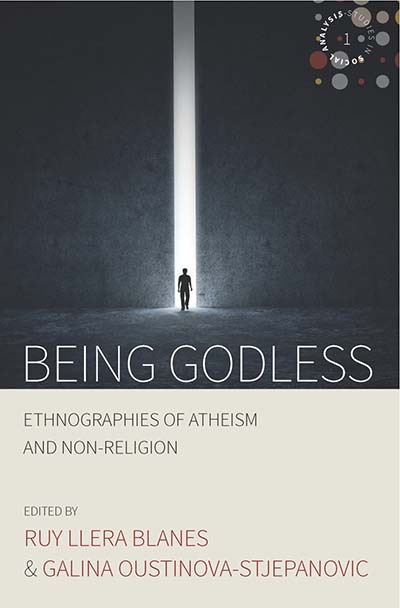 Volume 1
Volume 1
BEING GODLESS
Ethnographies of Atheism and Non-Religion
Edited by Ruy Llera Blanes and Galina Oustinova-Stjepanovic
Drawing on ethnographic inquiry and the anthropological literature on doubt and atheism, this volume explores people’s reluctance to pursue religion. The contributors capture the experiences of godless people and examine their perspectives on the role of religion in their personal and public lives. In doing so, the volume contributes to a critical understanding of the processes of disengagement from religion and reveals the challenges and paradoxes that godless people face.
Read Introduction: Godless People, Doubt, and Atheism
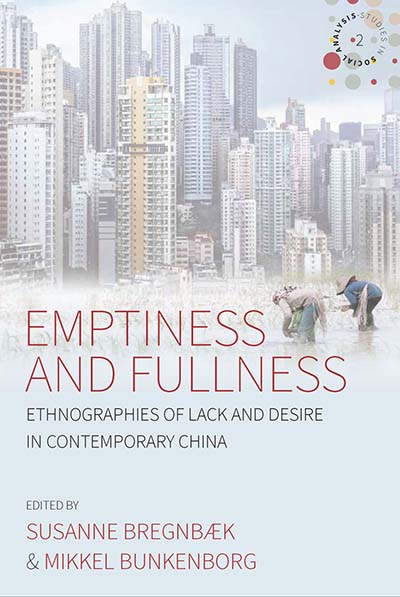 Volume 2
Volume 2
EMPTINESS AND FULLNESS
Ethnographies of Lack and Desire in Contemporary China
Edited by Susanne Bregnbæk and Mikkel Bunkenborg
As critical voices question the quality, authenticity, and value of people, goods, and words in post-Mao China, accusations of emptiness render things open to new investments of meaning, substance, and value. Exploring the production of lack and desire through fine-grained ethnography, this volume examines how diagnoses of emptiness operate in a range of very different domains in contemporary China: In the ostensibly meritocratic exam system and the rhetoric of officials, in underground churches, housing bubbles, and nationalist fantasies, in bodies possessed by spirits and evaluations of jade, there is a pervasive concern with states of lack and emptiness and the contributions suggest that this play of emptiness and fullness is crucial to ongoing constructions of quality, value, and subjectivity in China.
Read Introduction
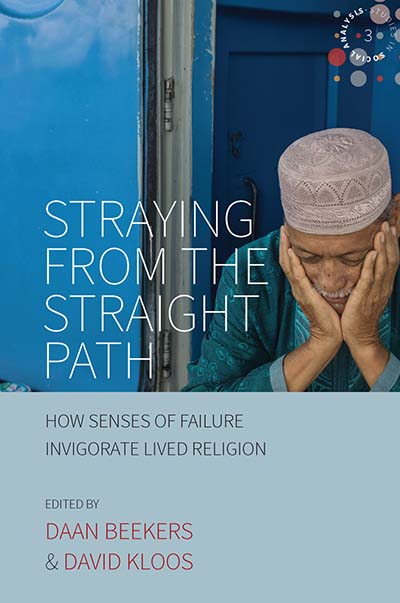 Volume 3
Volume 3
STRAYING FROM THE STRAIGHT PATH
How Senses of Failure Invigorate Lived Religion
Edited by Daan Beekers and David Kloos
“This rich collection of ethnographic studies of failure goes a long way in moving anthropological accounts of ethical and religious life beyond false dichotomies, including the very distinction between failure and success itself.” · Michael Lambek, Canada Research Chair University of Toronto Scarborough
If piety, faith, and conviction constitute one side of the religious coin, then imperfection, uncertainty, and ambivalence constitute the other. Yet, scholars tend to separate these two domains and place experiences of inadequacy in everyday religious life – such as a wavering commitment, religious negligence or weakness in faith – outside the domain of religion ‘proper.’ Straying from the Straight Path breaks with this tendency by examining how self-perceived failure is, in many cases, part and parcel of religious practice and experience. Responding to the need for comparative approaches in the face of the largely separated fields of the anthropology of Islam and Christianity, this volume gives full attention to moral failure as a constitutive and potentially energizing force in the religious lives of both Muslims and Christians in different parts of the world.
Read Introduction: The Productive Potential of Moral Failure in Lived Islam and Christianity
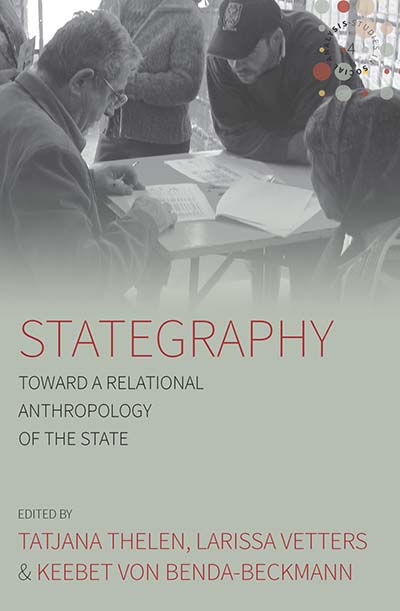 Volume 4
Volume 4
STATEGRAPHY
Toward a Relational Anthropology of the State
Edited by Tatjana Thelen, Larissa Vetters, and Keebet von Benda-Beckmann
Stategraphy—the ethnographic exploration of relational modes, boundary work, and forms of embeddedness of actors—offers crucial analytical avenues for researching the state. By exploring interactions and negotiations of local actors in different institutional settings, the contributors explore state transformations in relation to social security in a variety of locations spanning from Russia, Eastern Europe, and the Balkans to the United Kingdom and France. Fusing grounded empirical studies with rigorous theorizing, the volume provides new perspectives to broader related debates in social research and political analysis.
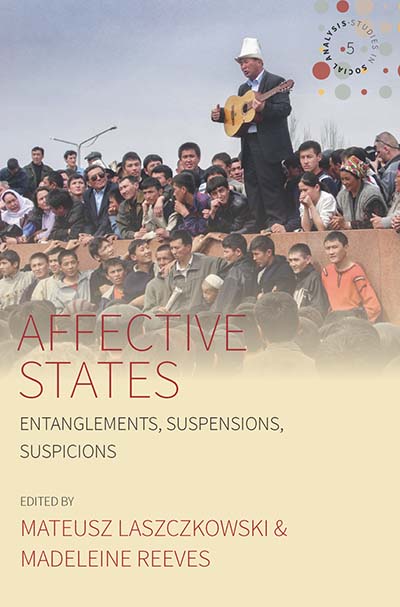 Volume 5
Volume 5
AFFECTIVE STATES
Entanglements, Suspensions, Suspicions
Edited by Mateusz Laszczkowski and Madeleine Reeves
In recent years, political and social theory has been transformed by the heterogeneous approaches to feeling and emotion jointly referred to as ‘affect theory’. These range from psychological and social-constructivist approaches to emotion to feminist and post-human perspectives. Covering a wide spectrum of topics and ethnographic contexts—from engineering in the Andes to household rituals in rural China, from South African land restitution to migrant living in Moscow, and from elections in El Salvador to online and offline surveillance among political refugees from Uzbekistan and Eritrea—the chapters in this volume interrogate this ‘affective turn’ through the lens of fine-grained ethnographies of the state. The volume enhances the anthropological understanding of the various ways through which the state comes to be experienced as a visceral presence in social life.
For a full list of titles in the series please visit http://www.berghahnbooks.com/series/studies-in-social-analysis
NEW SERIES:
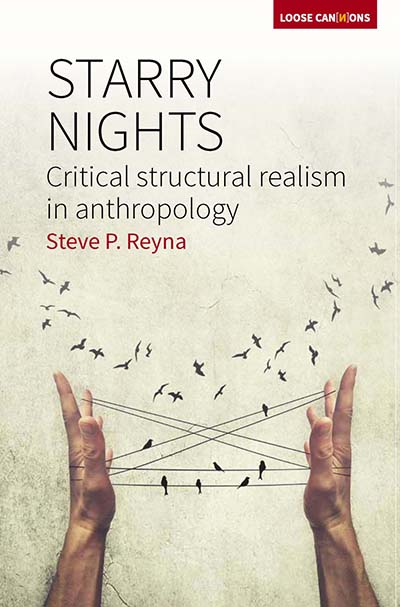 Volume 1, Loose Can(n)ons
Volume 1, Loose Can(n)ons
STARRY NIGHTS
Critical Structural Realism in Anthropology
Stephen P. Reyna
Starry Nights: Critical Structural Realism in Anthropology offers nothing less than a reinventing of the discipline of anthropology. In these six essays – four published here for the first time – Stephen Reyna critiques the postmodern tenets of anthropology, while devising a new strategy for conducting research. Combative and clear, Starry Nights provides an important critique of mainstream anthropology as represented by Geertz and the postmodern legacy, and envisions a mode of anthropological research that addresses social, cultural and biological questions with techniques that are theoretically rigorous and practically useful.
Read Introduction
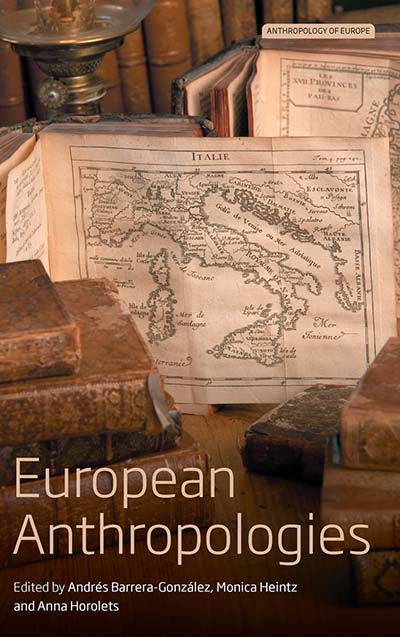 Volume 2, Anthropology of Europe
Volume 2, Anthropology of Europe
EUROPEAN ANTHROPOLOGIES
Edited by Andrés Barrera-González, Monica Heintz and Anna Horolets
In what ways did Europeans interact with the diversity of people they encountered on other continents in the context of colonial expansion, and with the peasant or ethnic ‘Other’ at home? How did anthropologists and ethnologists make sense of the mosaic of people and societies during the nineteenth and twentieth centuries, when their disciplines were progressively being established in academia? By assessing the diversity of European intellectual histories within sociocultural anthropology, this volume aims to sketch its intellectual and institutional portrait. It will be a useful reading for the students of anthropology, ethnology, history and philosophy of science, research and science policy makers.
Read Introduction: Strength from the Margins: Restaging European Anthropologies
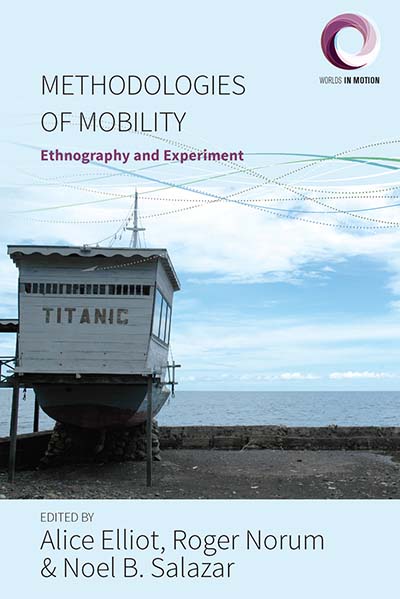 Volume 2, Worlds in Motion
Volume 2, Worlds in Motion
METHODOLOGIES OF MOBILITY
Ethnography and Experiment
Edited by Alice Elliot, Roger Norum, and Noel B. Salazar
Afterword by Simone Abram
Research into mobility is an exciting challenge for the social sciences that raises novel social, cultural, spatial and ethical questions. At the heart of these empirical and theoretical complexities lies the question of methodology: how can we best capture and understand a planet in flux? Methodologies of Mobility speaks beyond disciplinary boundaries to the methodological challenges and possibilities of engaging with a world on the move. With scholars continuing to face different forms and scales of mobility, this volume strategically traces innovative ways of designing, applying and reflecting on both established and cutting-edge methodologies of mobility.
Read Introduction: Studying Mobilities: Theoretical Notes and Methodological Queries
NEW:
 GENDER IN GEORGIA
GENDER IN GEORGIA
Feminist Perspectives on Culture, Nation, and History in the South Caucasus
Edited by Maia Barkaia and Alisse Waterston
Afterword by Elizabeth Cullen Dunn
As Georgia seeks to reinvent itself as a nation-state in the post-Soviet period, Georgian women are maneuvering, adjusting, resisting and transforming the new economic, social and political order. In Gender in Georgia, editors Maia Barkaia and Alisse Waterston bring together an international group of feminist scholars to explore the socio-political and cultural conditions that have shaped gender dynamics in Georgia from the late 19th century to the present. In doing so, they provide the first-ever woman-centered collection of research on Georgia, offering a feminist critique of power in its many manifestations, and an assessment of women’s political agency in Georgia.
Read Introduction: Contextualizing Gender in Georgia: Nation, Culture, Power and Politics
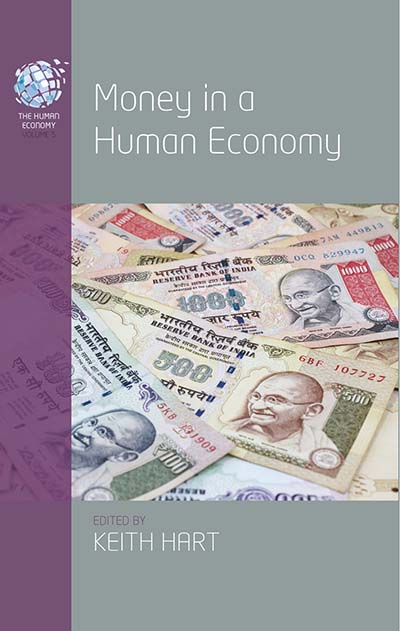 MONEY IN A HUMAN ECONOMY
MONEY IN A HUMAN ECONOMY
Edited by Keith Hart
Volume 5, The Human Economy
A human economy puts people first in emergent world society. Money is a human universal and now takes the divisive form of capitalism. This book addresses how to think about money (from Aristotle to the daily news and the sexual economy of luxury goods); its contemporary evolution (banking the unbanked and remittances in the South, cross-border investment in China, the payments industry and the politics of bitcoin); and cases from 19th century India and Southern Africa to contemporary Haiti and Argentina. Money is one idea with diverse forms. As national monopoly currencies give way to regional and global federalism, money is a key to achieving economic democracy.
Read Introduction: Money in a Human Economy
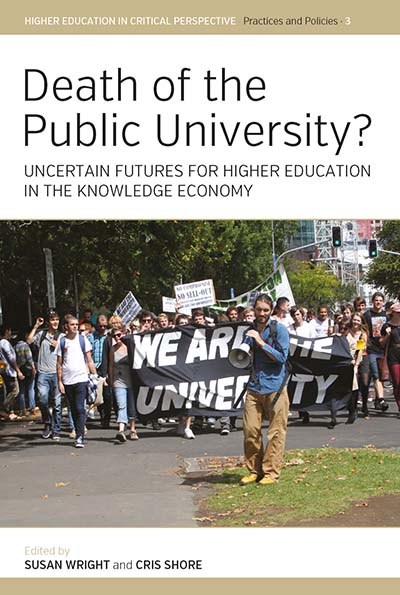 DEATH OF THE PUBLIC UNIVERSITY?
DEATH OF THE PUBLIC UNIVERSITY?
Uncertain Futures for Higher Education in the Knowledge Economy
Edited by Susan Wright and Cris Shore
Volume 3, Higher Education in Critical Perspective: Practices and Policies
Universities have been subjected to continuous government reforms since the 1980s, to make them ‘entrepreneurial’, ‘efficient’ and aligned to the predicted needs and challenges of a global knowledge economy. Under increasing pressure to pursue ‘excellence’ and ‘innovation’, many universities are struggling to maintain their traditional mission to be inclusive, improve social mobility and equality and act as the ‘critic and conscience’ of society. Drawing on a multi-disciplinary research project, University Reform, Globalisation and Europeanisation (URGE), this collection analyses the new landscapes of public universities emerging across Europe and the Asia-Pacific, and the different ways that academics are engaging with them.
Read Introduction: Privatizing the Public University: Key Trends, Countertrends and Alternatives
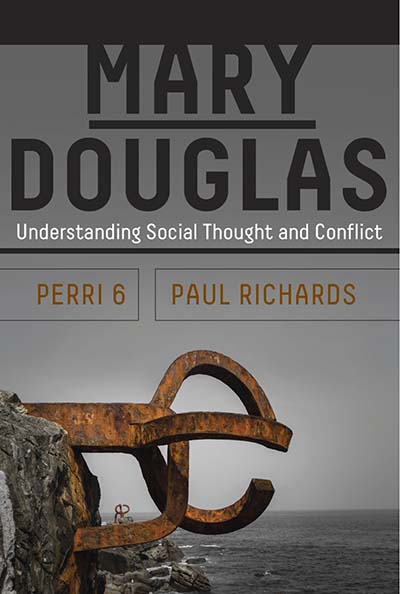 MARY DOUGLAS
MARY DOUGLAS
Understanding Social Thought and Conflict
Perri 6 and Paul Richards
Mary Douglas’s innovative explanations for styles of human thought and for the dynamics of institutional change have furnished a distinctive and powerful theory of how conflicts are managed, yet her work remains astonishingly poorly appreciated in social science disciplines. This volume introduces Douglas’s theories, and outlines the ways in which her work is of continuing importance for the future of the social sciences. Mary Douglas: Understanding Human Thought and Conflict shows how Douglas laid out the agenda for revitalizing social science by reworking Durkheim’s legacy for today, and reviews the growing body of research across the social sciences which has used, tested or developed her approach.
Read Introduction
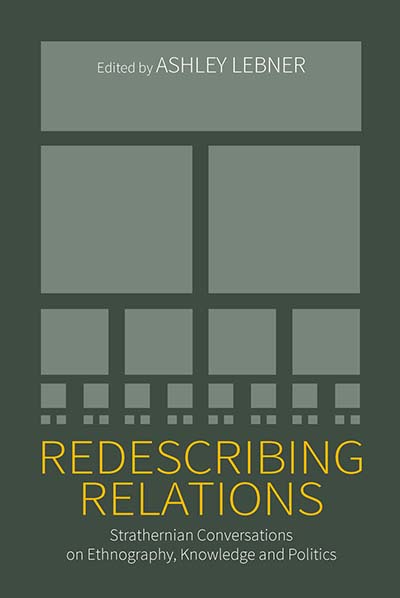 REDESCRIBING RELATIONS
REDESCRIBING RELATIONS
Strathernian Conversations on Ethnography, Knowledge and Politics
Edited by Ashley Lebner
Afterword by Marilyn Strathern
Marilyn Strathern is among the most creative and celebrated contemporary anthropologists, and her work draws interest from across the humanities and social sciences. Redescribing Relations brings some of Strathern’s most committed and renowned readers into conversation in her honour – especially on themes she has rarely engaged. The volume not only deepens our understanding of Strathern’s work, it also offers models of how to extend her relational insights to new terrains. With a comprehensive introduction, a complete list of Strathern’s publications and a historic interview published in English for the first time, this is an invaluable resource for Strathern’s old and new interlocutors alike.
Read Introduction: Strathern’s Redescription of Anthropology
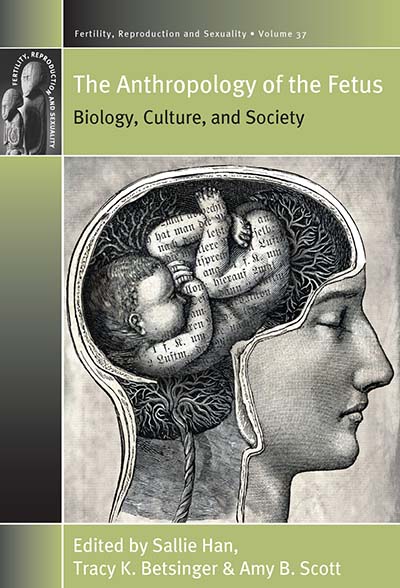 THE ANTHROPOLOGY OF THE FETUS
THE ANTHROPOLOGY OF THE FETUS
Biology, Culture, and Society
Edited by Sallie Han, Tracy K. Betsinger, and Amy B. Scott
Foreword by Rayna Rapp
Volume 37, Fertility, Reproduction and Sexuality: Social and Cultural Perspectives
As a biological, cultural, and social entity, the human fetus is a multifaceted subject which calls for equally diverse perspectives to fully understand. Anthropology of the Fetus seeks to achieve this by bringing together specialists in biological anthropology, archaeology, and cultural anthropology. Contributors draw on research in prehistoric, historic, and contemporary sites in Europe, Asia, North Africa, and North America to explore the biological and cultural phenomenon of the fetus, raising methodological and theoretical concerns with the ultimate goal of developing a holistic anthropology of the fetus.
Read Introduction: Conceiving the Anthropology of the Fetus: An Introduction
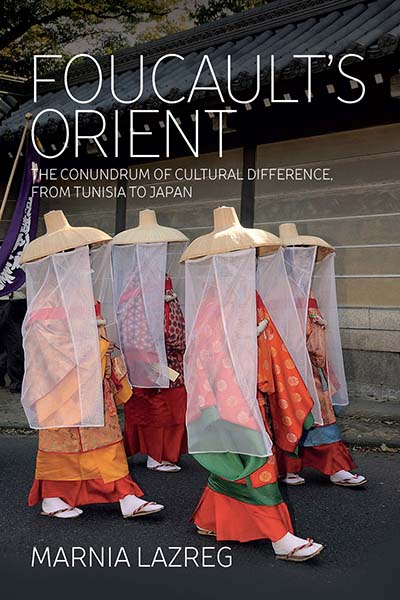 FOUCAULT’S ORIENT
FOUCAULT’S ORIENT
The Conundrum of Cultural Difference, From Tunisia to Japan
Marnia Lazreg
Foucault lived in Tunisia for two years and travelled to Japan and Iran more than once. Yet throughout his critical scholarship, he insisted that the cultures of the “Orient” constitute the “limit” of Western rationality. Using archival research supplemented by interviews with key scholars in Tunisia, Japan and France, this book examines the philosophical sources, evolution as well as contradictions of Foucault’s experience with non-Western cultures. Beyond tracing Foucault’s journey into the world of otherness, the book reveals the personal, political as well as methodological effects of a radical conception of cultural difference that extolled the local over the cosmopolitan.
Read Introduction
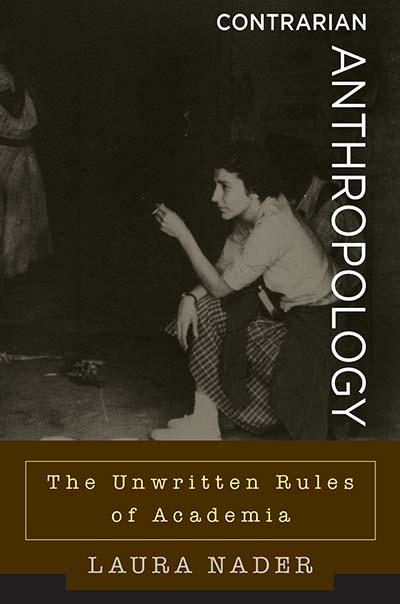 Forthcoming
Forthcoming
CONTRARIAN ANTHROPOLOGY
The Unwritten Rules of Academia
Laura Nader
Analyzing the workings of boundary maintenance in the areas of anthropology, energy, gender, and law, Nader contrasts dominant trends in academia with work that pushes the boundaries of acceptable methods and theories. Although the selections illustrate the history of one anthropologist’s work over half a century, the wider intent is to label a field as contrarian to reveal unwritten rules that sometimes hinder transformative thinking and to stimulate boundary crossing in others.
NEW IN PAPERBACK:
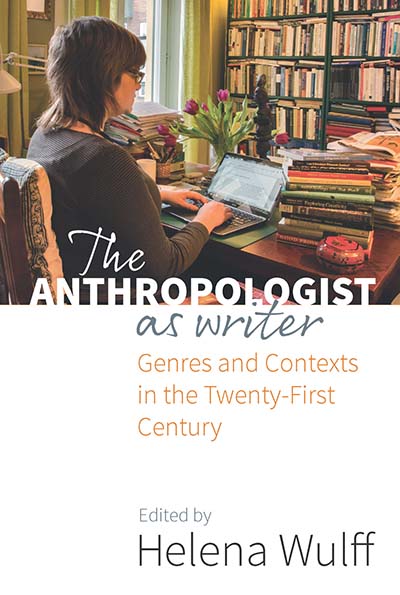 THE ANTHROPOLOGIST AS WRITER
THE ANTHROPOLOGIST AS WRITER
Genres and Contexts in the Twenty-First Century
Edited by Helena Wulff
Writing is crucial to anthropology, but which genres are anthropologists expected to master in the 21st century? This book explores how anthropological writing shapes the intellectual content of the discipline and academic careers. First, chapters identify the different writing genres and contexts anthropologists actually engage with. Second, this book argues for the usefulness and necessity of taking seriously the idea of writing as a craft and of writing across and within genres in new ways. Although academic writing is an anthropologist’s primary genre, they also write in many others, from drafting administrative texts and filing reports to composing ethnographically inspired journalism and fiction.
Read Introducing the Anthropologist as Writer: Across and Within Genres
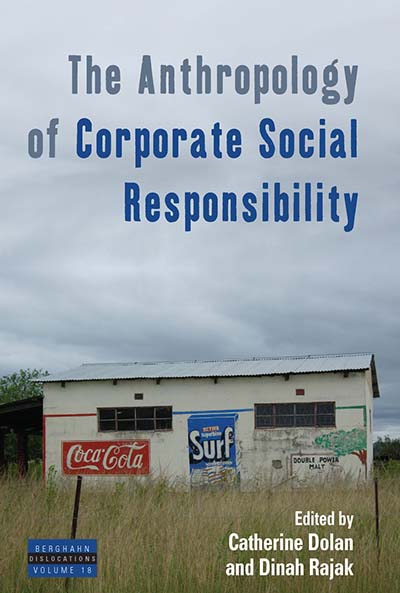 THE ANTHROPOLOGY OF CORPORATE SOCIAL RESPONSIBILITY
THE ANTHROPOLOGY OF CORPORATE SOCIAL RESPONSIBILITY
Edited by Catherine Dolan and Dinah Rajak
Afterword by Robert J. Foster
Volume 18, Dislocations
The Anthropology of Corporate Social Responsibility explores the meanings, practices, and impact of corporate social and environmental responsibility across a range of transnational corporations and geographical locations (Bangladesh, Cameroon, Chile, the Democratic Republic of the Congo, Ghana, India, Peru, South Africa, the UK, and the USA). The contributors examine the expectations, frictions and contradictions the CSR movement is generating and addressing key issues such as the introduction of new forms of management, control, and discipline through ethical and environmental governance or the extent to which corporate responsibility challenges existing patterns of inequality rather than generating new geographies of inclusion and exclusion.
Read Introduction: Towards an Anthropology of Corporate Social Responsibility
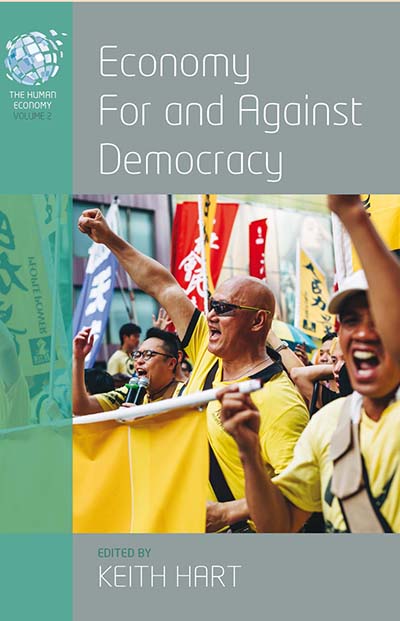 ECONOMY FOR AND AGAINST DEMOCRACY
ECONOMY FOR AND AGAINST DEMOCRACY
Edited by Keith Hart
Volume 2, The Human Economy
Political constitutions alone do not guarantee democracy; a degree of economic equality is also essential. Yet contemporary economies, dominated as they are by global finance and political rent-seekers, often block the realization of democracy. The comparative essays and case studies of this volume examine the contradictory relationship between the economy and democracy and highlight the struggles and visions needed to make things more equitable. They explore how our collective aspirations for greater democracy might be informed by serious empirical research on the human economy today. If we want a better world, we must act on existing social realities.
Read Introduction
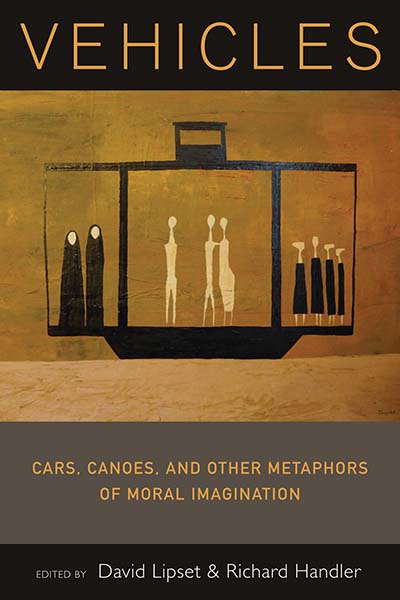 VEHICLES
VEHICLES
Cars, Canoes, and Other Metaphors of Moral Imagination
Edited by David Lipset and Richard Handler
Metaphor, as an act of human fancy, combines ideas in improbable ways to sharpen meanings of life and experience. Theoretically, this arises from an association between a sign—for example, a cattle car—and its referent, the Holocaust. These “sign-vehicles” serve as modes of semiotic transportation through conceptual space. Likewise, on-the-ground vehicles can be rich metaphors for the moral imagination. Following on this insight, Vehicles presents a collection of ethnographic essays on the metaphoric significance of vehicles in different cultures. Analyses include canoes in Papua New Guinea, pedestrians and airplanes in North America, lowriders among Mexican-Americans, and cars in contemporary China, Japan, and Eastern Europe, as well as among African-Americans in the South. Vehicles not only “carry people around,” but also “carry” how they are understood in relation to the dynamics of culture, politics and history.
Read Introduction: Charon’s Boat and Other Vehicles of Moral Imagination
 WHAT IS EXISTENTIAL ANTHROPOLOGY?
WHAT IS EXISTENTIAL ANTHROPOLOGY?
Edited by Michael Jackson and Albert Piette
What is existential anthropology, and how would you define it? What has been gained by using existential perspectives in your fieldwork and writing? Editors Michael Jackson and Albert Piette each invited anthropologists on both sides of the Atlantic to address these questions and explore how various approaches to the human condition might be brought together on the levels of method and of theory. Both editors also bring their own perspective: while Jackson has drawn on phenomenology, deploying the concepts of intersubjectivity, lifeworld, experience, existential mobility, and event, Piette has drawn on Heidegger’s Dasein-analysis, and developed a phenomenographical method for the observation and description of human beings in their singularity and ever-changing situations.
Read Introduction: Anthropology and the Existential Turn
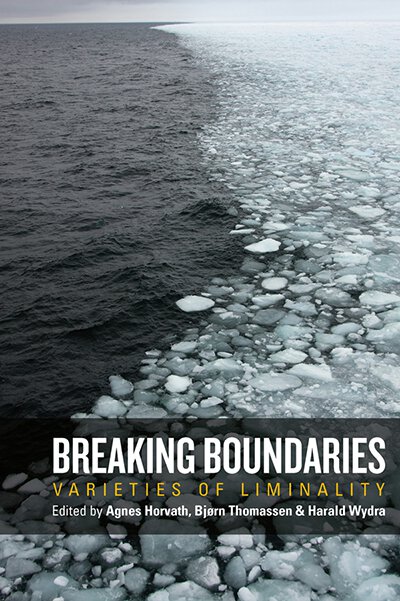 BREAKING BOUNDARIES
BREAKING BOUNDARIES
Varieties of Liminality
Edited by Agnes Horvath, Bjørn Thomassen, and Harald Wydra
Liminality has the potential to be a leading paradigm for understanding transformation in a globalizing world. As a fundamental human experience, liminality transmits cultural practices, codes, rituals, and meanings in situations that fall between defined structures and have uncertain outcomes. Based on case studies of some of the most important crises in history, society, and politics, this volume explores the methodological range and applicability of the concept to a variety of concrete social and political problems.
Read Introduction: Liminality and the Search for Boundaries
Berghahn Journals
NEW in 2018!
Migration and Society is an interdisciplinary peer-reviewed journal advancing debate about emergent trends in all types of migration.
The Journal of Legal Anthropology (JLA) is a peer-reviewed journal committed to anthropological understandings of socio-legal and cultural encounters.
Now under the editorship of Martin Holbraad!
Social Analysis is an international peer-reviewed journal devoted to exploring the analytical potentials of anthropological research.
Receive Free Access to the top viewed articles until Dec 9!
 Anthropological Journal of European Cultures
Anthropological Journal of European Cultures
Anthropological Journal of European Cultures engages with current debates and innovative research agendas addressing the social and cultural transformations of contemporary European societies.
Current Issue: Volume 26, Issue 2: Changing Places, Changing People: Critical Heritages of Migration and Belonging
Anthropology in Action is a peer-reviewed journal publishing articles, commentaries, research reports, and book reviews in applied anthropology.
Current Issue: Volume 24, Issue 3
 Anthropology of the Middle East
Anthropology of the Middle East
Anthropology of the Middle East is a peer-reviewed journal provides a forum for scholarly exchange between anthropologists and other social scientists working in and on the Middle East.
Current Issue: Volume 12, Issue 1: The Anthropology of Children in the Middle East
Boyhood Studies is a peer-reviewed journal providing a forum for the discussion of boyhood, young masculinities, and boys’ lives by exploring the full scale of intricacies, challenges, and legacies that inform male and masculine developments.
Current Issue: Volume 10, Issue 2: Contemporary Boys’ Literacies and Boys’ Literatures
 The Cambridge Journal of Anthropology
The Cambridge Journal of Anthropology
The Cambridge Journal of Anthropology is a peer-reviewed journal providing a forum for the discussion of boyhood, young masculinities, and boys’ lives by exploring the full scale of intricacies, challenges, and legacies that inform male and masculine developments.
Receive free access to the Marilyn Strathern lectures until the end of the year!
Conflict and Society expands the field of conflict studies by using ethnographic inquiry to establish new fields of research and interdisciplinary collaboration.
Current Issue: Volume 3
 Durkheimian Studies / Études Durkheimiennes
Durkheimian Studies / Études Durkheimiennes
Durkheimian Studies expands the field of conflict studies by using ethnographic inquiry to establish new fields of research and interdisciplinary collaboration.
Current Issue: Volume 22
Environment and Society publishes critical reviews of the latest research literature on environmental studies, including subjects of theoretical, methodological, substantive, and applied significance.
Current Issue: Volume 8: Measurements and Metrics
Provides insights into contemporary socio-ecological issues with posts from top scholars in the social sciences that engage readers interested in current environmental topics.
 Focaal: Journal of Global and Historical Anthropology
Focaal: Journal of Global and Historical Anthropology
Focaal is a peer-reviewed journal advocating an approach that rests in the simultaneity of ethnography, processual analysis, local insights, and global vision.
Current Issue: Volume 2017, Issue 78: Boredom after the global financial crisis: From privilege to precarity
It aims to accelerate and intensify anthropological conversations beyond what a regular academic journal can do, and to make them more widely, globally, and swiftly available.
Girlhood Studies is a peer-reviewed journal providing a forum for the critical discussion of girlhood from a variety of disciplinary perspectives.
Current Issue: Volume 10, Issue 2: Technologies of Nonviolence: Reimagining Mobile and Social Media Practices in the Lives of Girls and Young Women
Journeys is an interdisciplinary journal that explores travel as a practice and travel writing as a genre, reflecting the rich diversity of travel and journeys as social and cultural practices as well as their significance as metaphorical processes.
Current Issue: Volume 18, Issue 1
Learning and Teaching is a peer-reviewed journal that uses the social sciences to reflect critically on learning and teaching in the changing context of higher education.
Current Issue: Volume 10, Issue 2
Museum Worlds is a multidisciplinary, refereed, annual journal that publishes work that significantly advances knowledge of global trends, case studies, and theory relevant to museum practice and scholarship around the world.
Current Issue: Volume 5
Complements the journal by bringing current museum themes, practices, and developments to the forefront of global discussions in the field of Museum Studies.
Nature and Culture is a forum for the international community of scholars and practitioners to present, discuss, and evaluate critical issues and themes related to the historical and contemporary relationships that societies, civilizations, empires, regions, nation-states have with Nature.
Current Issue: Volume 12, Issue 3
Regions and Cohesion is a needed platform for academics and practitioners alike to disseminate both empirical research and normative analysis of topics related to human and environmental security, social cohesion, and governance.
Current Issue: Volume 7, Issue 2
Religion and Society: Advances in Research responds to the need for a rigorous, in-depth review of current work in the expanding sub-discipline of the anthropology of religion.
Current Issue: Volume 8
Sibirica is a peer-reviewed interdisciplinary journal covering all aspects of the region and relations to neighboring areas, such as Central Asia, East Asia, and North America.
Current Issue: Volume 16, Issue 2
Transfers is a peer-reviewed journal publishing cutting-edge research on the processes, structures and consequences of the movement of people, resources, and commodities.
Current Issue: Volume 7, Issue 3: Mobilities in a Dangerous World

 Migration and Society
Migration and Society Social Analysis
Social Analysis Anthropology in Action
Anthropology in Action Boyhood Studies
Boyhood Studies Conflict & Society
Conflict & Society Environment and Society
Environment and Society Girlhood Studies
Girlhood Studies Journeys
Journeys Learning and Teaching
Learning and Teaching Museum Worlds
Museum Worlds Nature and Culture
Nature and Culture Regions and Cohesion
Regions and Cohesion Religion and Society
Religion and Society Sibirica
Sibirica Transfers
Transfers